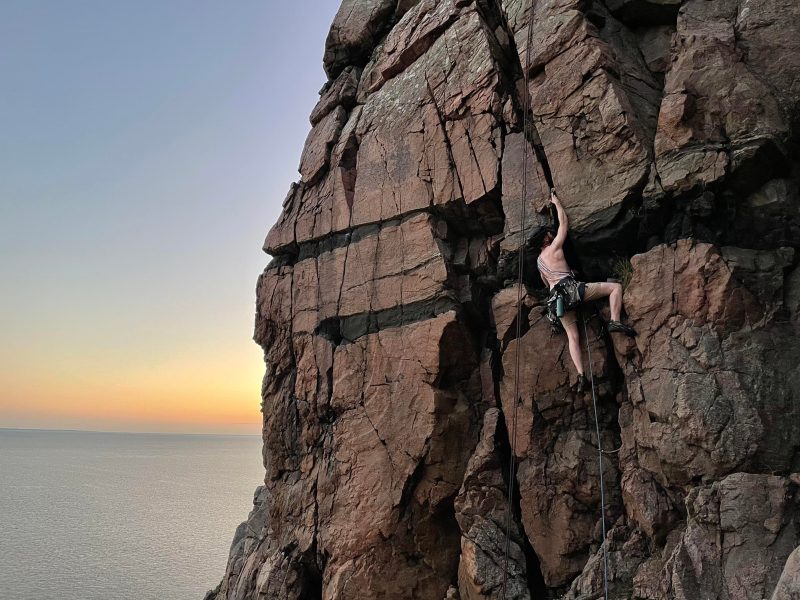
Climbing the Science Wall
The freedom of being his own boss and managing his own time attracted Carl Johan Hagströmer to continue his research career and pursue a postdoc at Karolinska Institutet. Most importantly he enjoys working with his research group. “Finding a team that you genuinely like is crucial. You can always learn to appreciate a specific project.”
Written by Terese von Knorring, PhD student at the University of Copenhagen and participant of the course “Career Skills for Scientists” during the spring term 2024
After five years of PhD studies (2018-2023) in biochemistry at Lund University, working in a research environment felt like home for Carl Johan Hagströmer. Continuing with a postdoc at Karolinska Institutet was a natural choice when his girlfriend got a job in Stockholm. He discovered a small research group actively seeking someone with expertise in structural biology and applied for the position.
“It was a field that I am interested in and a method I had been wanting to learn, and, very importantly, the principal investigator is a young and inspiring researcher with whom I could see myself working.”
During his PhD he studied how water channels in cells, called aquaporins, work by looking at their structure using x-ray crystallography. Now, in his postdoctoral work, he is using cryogenic electron microscopy to explore how small antibodies can block viral proteins.
According to Carl Johan, the most crucial factor when looking for a postdoc is finding people you enjoy working with. The research group at Karolinska Institutet consists of three young researchers, complementing each other with different expertise. While Carl Johan has been fortunate with his colleagues, he acknowledges the challenges of finding the right research group. He suggests doing an MSc thesis or internship with the group you are considering before pursuing a PhD and assessing the group’s chemistry before committing to a postdoc.
“Not all researchers are as socially skilled. Finding a principal supervisor that matches your personality is imperative. You can always learn to like the project.”
Network widely
To attend social events and network is something that Carl Johan sees as especially important when working in academia.
“Building connections within and outside your field is important for future collaborations. Inviting older colleagues for a beer is a good idea.”
Carl Johan finds social interaction and teaching among the most fulfilling components of research. Alongside a flexible work-life balance and the ability to work from home, he appreciates being his own boss.
“The freedom and flexibility are essential to me.”
A Call for Research Reform
Continuing in academia wasn’t always a clear choice for Carl Johan. He wishes he had received more information about academic life during his education.
“I saw a PhD as a cool thing, and a postdoc as a way to continue in a familiar field. I didn’t know much about what a future career in academia looked like.”
Carl Johan recognizes that a career in academia is not suitable for everyone, especially if you are planning to settle down and start a family. The challenges of postdoctoral work include extended periods abroad, funding applications, and job uncertainties. Maternity leave and paid vacation aren’t guaranteed for postdocs on stipends.
“A professor once joked that a pro tip for being a researcher is to find a partner who earns a lot. The whole system is outdated, and often you have to be prepared to sacrifice your private life.”
While Carl Johan sees a need for change in the research world, he believes it will take time.
“Global change is necessary for the research field to evolve. It’s not an easy task, especially when dealing with more conservative countries.”
Solving Problems
Carl Johan is open to the idea of working in the industry, with the higher salary being a significant factor. He envisions stepping into management roles or becoming a patent attorney in the future, utilizing the expertise he has gained through years of research.
“There are numerous opportunities for researchers in the industry. You are an expert in your field, and it opens many doors.”
A passionate climber in his free time, Carl Johan sees similarities in research and climbing.
“Both in research and climbing, you try to solve a problem. You can climb the same wall, not getting it, but then suddenly you realize something and manage to climb up. Sharing insights and tips on strategies is crucial. To be good, you need to enjoy what you do.”
Career Tips from Carl Johan for an academic career:
- Find a principal investigator and research group you enjoy. Consider an internship!
- Stay updated on developments and trends in your research field.
- Attend conferences and social events.
- Network both within and outside your field.
- Build relationships with older colleagues.
- Don’t forget to have fun!

0 comments